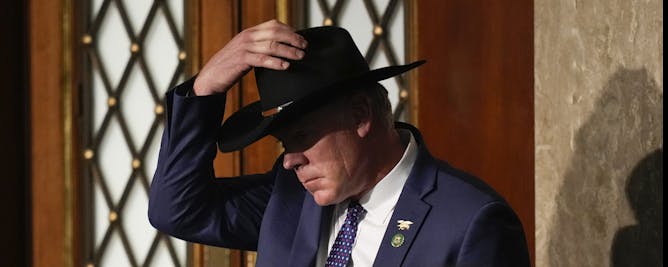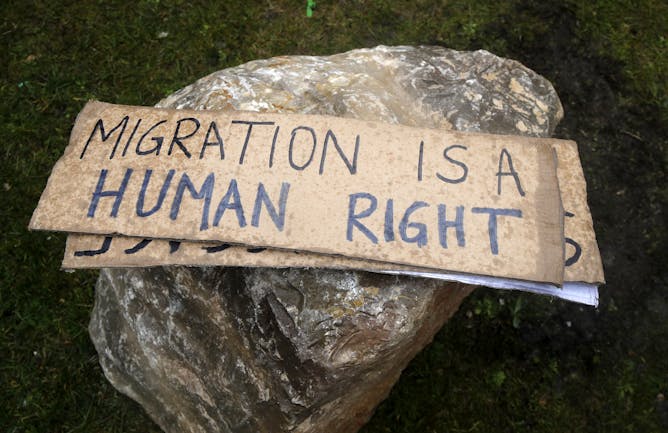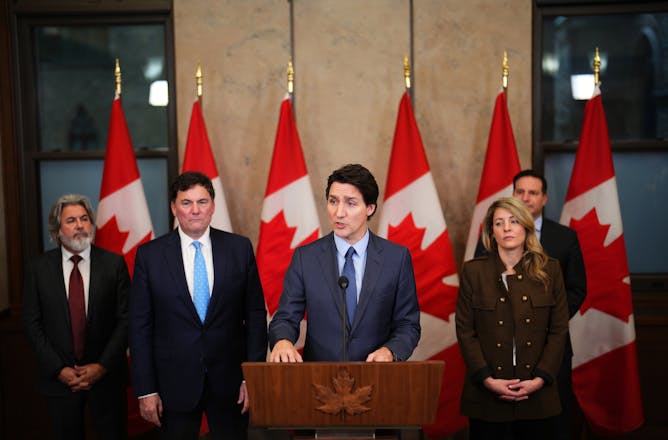|
In recent weeks, Republican lawmakers in the United States have been decrying the fact that migrants are entering the U.S. via the Canadian border. One has even likened the situation to an assault.
Today in The Conversation Canada, Laura Madokoro of Carleton University delves into the issue and the history of border politics in the United States — and how the American anti-migrant playbook has been used in Canada, too.
She writes that given the history of the U.S.-Mexico border, and the highly militarized response to migrants arriving there, it’s not really a surprise that American politicians are now using similar anti-migrant rhetoric about the Canada-U.S. boundary too. But she argues that rather than demonizing migrants, legislators everywhere should address the issues that lead them to migrate in the first place.
Also today:
All the best,
|

Montana Republican congressman Ryan Zinke, once Donald Trump’s Interior Secretary, is among the politicians raising alarms about the Canada-U.S. border. Zinke referrred to migrants crossing into the U.S. from Canada as an assault.
(AP Photo/Andrew Harnik)
Laura Madokoro, Carleton University
Rather than demonize migrants, legislators everywhere should address the issues that force them to migrate.
|

A placard placed by local activists in Calais, northern France, March 8, 2023. Rhetoric about the threat posed by climate-induced displacement does not accurately portray the reality for most of those affected.
(AP Photo/Michel Spingler)
Yvonne Su, York University, Canada; Corey Robinson, Durham University
Recognizing the challenges posed by climate-induced displacement is important. But officials must avoid rhetoric about displaced people that can fuel xenophobia.
|

The Rogers-Shaw deal is the largest merger to be challenged before the Competition Tribunal.
THE CANADIAN PRESS/Adrian Wyld
Jennifer Quaid, L’Université d’Ottawa/University of Ottawa
The Rogers-Shaw decision is proving to be a legally significant case for Canada by setting a precedent that might make merger challenges harder in the future.
|

A statue of Franz Kafka by the sculptor Jaroslav Róna in Prague, Czech Republic, inspired by Kafka’s short story “Description of a Struggle.”
(Shutterstock)
Alexander Carpenter, University of Alberta
Franz Kafka was not well known during his lifetime, but his legacy provides a useful and necessary way to confront the current state of global affairs.
|

Le Premier ministre Justin Trudeau s'exprime lors d'une conférence de presse sur la Colline du Parlement, le 6 mars 2023, annonçant une enquête sur l'ingérence dans les élections.
La Presse canadienne/Sean Kilpatrick
Sam Routley, Western University
Les fuites concernant l’ingérence de la Chine dans les élections canadiennes vont au-delà d'une crise politique. Il s’agit d’une crise de sécurité nationale.
|
Arts
|
-
Amy McCarthy, York St John University
The oral history showcases how the indie music scene became a way for many New Yorkers to channel their grief after 9/11.
|
|
Business + Economy
|
-
William Chittenden, Texas State University
SVB, as it’s known, collapsed with lightning speed following a run on its deposits.
|
|
Health
|
-
Michael Head, University of Southampton
The WHO first described COVID as a pandemic on March 11, 2020. Where are we at, three years later?
-
Beth Ann Malow, Vanderbilt University
Americans are divided on their preference for daylight saving time versus standard time. But research shows that our bodies fare better when aligned with the natural light of standard time.
|
|
Politics
|
-
Nancy Mitchell, North Carolina State University
Carter’s work in Zimbabwe forms a significant and under appreciated part of his legacy
|
|